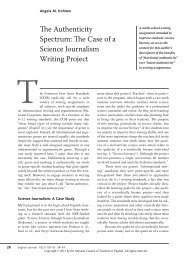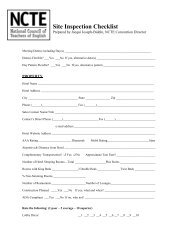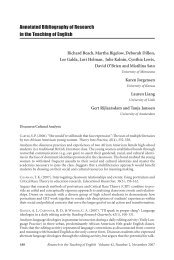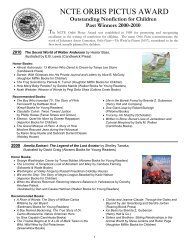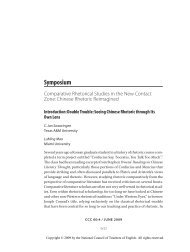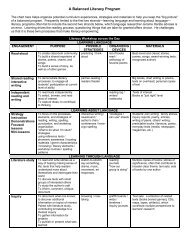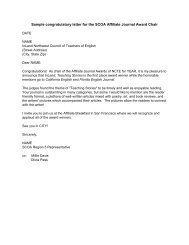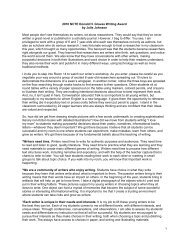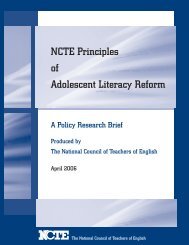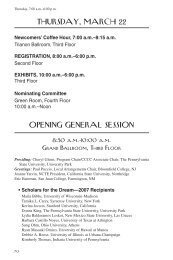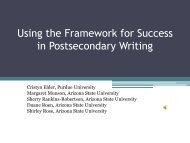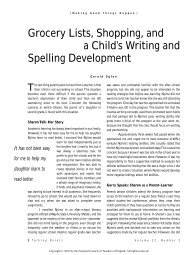1 Float Like a Plane, Sting Like a Bomb: The Ethics of US Drone ...
1 Float Like a Plane, Sting Like a Bomb: The Ethics of US Drone ...
1 Float Like a Plane, Sting Like a Bomb: The Ethics of US Drone ...
You also want an ePaper? Increase the reach of your titles
YUMPU automatically turns print PDFs into web optimized ePapers that Google loves.
about infrastructure? <strong>The</strong>re are six hundred thousand bridges in need <strong>of</strong> repair in thiscountry, along with over one hundred dams and countless highways and sewer systems(Kelderman). Instead <strong>of</strong> giving billions <strong>of</strong> dollars toward building and maintainingdrones, we should be, for instance, funding the one-trillion-dollar-make-over that ourcountry’s infrastructure needs.Dr. Lori E. Amy, a pr<strong>of</strong>essor in the Department <strong>of</strong> Writing and Linguistics atGeorgia Southern University, describes one <strong>of</strong> her students in her book <strong>The</strong> Wars WeInherit: Military Life, Gender Violence, and Memory as having had a husband in the warin Iraq. Before leaving the student’s husband had a kind, gentle, wouldn’t-hurt-a-flyattitude, but when he returned he had a short fuse and <strong>of</strong>ten hit her (Amy 145). In a studyby the Journal <strong>of</strong> the American Medical Association, it was discovered that one out <strong>of</strong>four soldiers return from Iraq and Afghanistan with posttraumatic stress disorder(Friedman). What is even more haunting is that in some reports more veterans <strong>of</strong> the Iraqor Afghanistan commit suicide than they die behind enemy lines (Sw<strong>of</strong>ford). It is amundane happenstance that normal—emotionally, mentally—men and women are goinginto the machine <strong>of</strong> war-training only to be spit out on the conveyer belt as a “soldier”; arobot built with degradation and humiliation. “Enculturation into the military is designedto strip a person <strong>of</strong> individual identity, to make loyalty to the group, obedience tosuperiors, and duty the core <strong>of</strong> identity” (Amy 131). <strong>The</strong> machine <strong>of</strong> war breeds sadistsnot soldiers, products who would rather kill themselves than go living with what they’vedone; unable to find peace.All <strong>of</strong> these are facets <strong>of</strong> the an unethical mirror—Obama’s kill list, the terribleexample the United States is making on countries all around the world, the violence andanti-American sentiment drone attacks create, double-hatting, the billions <strong>of</strong> dollarswasted on lobbying and manufacturing drones, the psychological problems they cause insoldiers, the disproportional use <strong>of</strong> force in many cases <strong>of</strong> targeted killings, the death <strong>of</strong>civilians, the inhumanity. When all the pieces are assembled, the reflection looking backat us is the hideous face <strong>of</strong> hate, prejudice, <strong>of</strong> the drone, <strong>of</strong> America. Lack <strong>of</strong> accuratemedia coverage doesn’t leave room for a community <strong>of</strong> seeing, a place to bear witness tothis hideous face, keeping us from peering into the mirror; outraged by the media, author<strong>of</strong> <strong>The</strong> Violence <strong>of</strong> Peace: America’s Wars in the Age <strong>of</strong> Obama and law pr<strong>of</strong>essor <strong>of</strong>Yale Stephen L. Carter said, “And there’s another ethical problem that we don’t spendenough time thinking about, and that’s the way that the drone war goes away from thefront pages. It’s not on the evening news…it’s done in secret, it’s clandestine, it’s hard tokeep track, and we really should know what’s being done in our name” (Carter).It’s the attempts to legitimize the legality <strong>of</strong> drones that has deformed America; itrepresents a dramatic reversal <strong>of</strong> history, a sick Darwinian flip that devolves the masses, aregression <strong>of</strong> <strong>US</strong> law and policy that “threaten[s] to do irreparable harm to theinternational legal framework designed to establish and uphold foundational protectionsfor the right to life and human dignity” (Alston 5). As a nonviolent resister and anti-waractivist Muhammad Ali spoke out on many occasions about peace. <strong>The</strong> morning afterwinning his match with Sonny Liston, the match that made him the new heavyweightchampion <strong>of</strong> the world, he attended a press conference where he said, “I believe…inpeace” (Hauser 83). If we could all adopt the values Muhammad Ali embodies, if thesoldiers controlling drones and the leaders in this country that let it happen—cause it tohappen—could stop and see the harm that they are causing the world, it would be the first9



